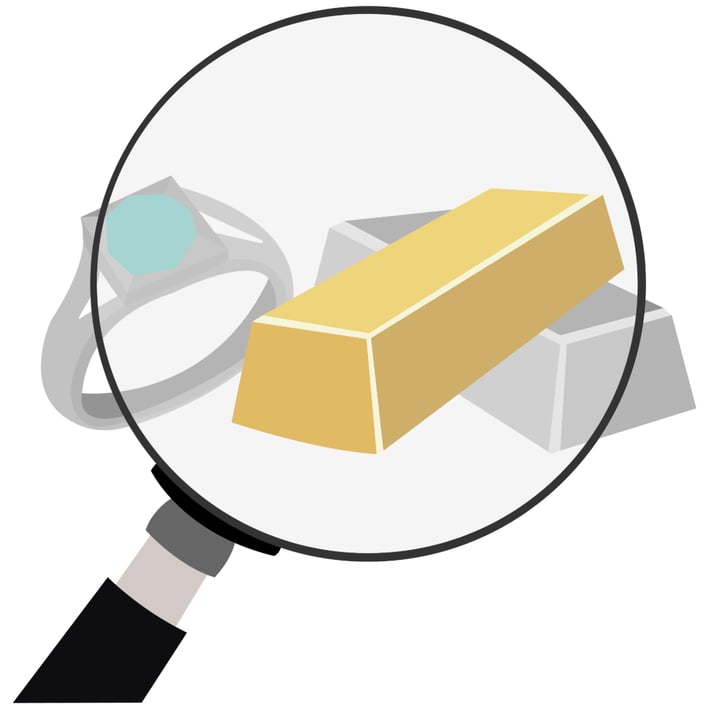- Resources
- Precious Metals Control
Trust is good, precious metals control is better

All that glitters: precious metals control and what you need to know
The precious metals control legislation affects everyone who wants to trade jewellery or other items containing precious metals across the border into Switzerland. Be aware that the controls are meticulous! Even very small proportions are relevant and must be declared without exception. 
But that description alone means you will need to explain your business and deal with precious metals control legislation. Just using the term “GOLD-coloured” will alert the Swiss customs algorithm and mark your goods as suspected precious metals.
No matter what you want to send, getting the initial declaration wrong always has the same consequences. The goods will be held back, arrive late or never, your customers will get angry, they may have to pay additional customs duties, you get angry, and maybe your business partners get angry. And why?
A closer look: precious metals and goods that will not escape scrutiny
Gollum’s “Precious” would most certainly be subject to precious metals control, as four metals are explicitly listed in legislation: gold, silver, platinum and palladium. The legislation is aimed not only at pure precious metal goods, but also goods that are coated with these precious metals – also known as plated articles.
There are also other product groups for which the requirements are less clear. To give you a feeling for what can be subject to precious metals control in Switzerland, we will provide a few examples:
- Watch cases made of precious metals or coated with precious metals
- Coins and bars made of precious metals
- Cutlery and crockery made of precious metal or coated with precious metal
- Electronic components and connections containing precious metals
As you can see from the list, these are extremely different product groups – even electronics can be affected!
Particularly if you are just getting started in the industry, you should research all Swiss customs regulations before you send the goods. This is especially important for a newcomer, as you don’t have a positive track record yet. You’re likely to receive “stricter” treatment on your first import attempts since you’re not a certified dealer, so you shouldn’t leave anything to chance.
Golden rules for staying on the safe side during the precious metals control
You have now learned:
- Who is subject to precious metals control
- What is subject to precious metals control
Do you already have questions or would you like to book a non-binding consultation? Then you can get your personal consultation appointment here.
You will not be surprised to learn that the Precious Metals Control Act is a vast, sprawling and complex area that requires at least ten years of study to fully understand.
Therefore, this article assesses the more practical aspects. This section looks at the formal elements that your export must cover in order to avoid ending up in the S (for suspicious) folder.
Standard of fineness information
One of the best-known standards of fineness is probably 925 for silver, also known as “sterling silver”. The 925 means that the alloy consists of 92.5% pure silver. This alloy is quite conventional and therefore relatively easy for customs to handle. Using certified materials for precious metal goods offers benefits such as faster and easier verification processes, lower fees and increased customer confidence. It simplifies the export process and improves the acceptance of the goods on the Swiss market.
Responsibility mark
The responsibility mark indicates who is responsible for the composition and labelling of the product. It must be registered with the Central Office for Precious Metals Control in Switzerland. Registration costs CHF 800 and remains valid for 20 years.
Think of the responsibility mark as a type of signature that indicates that you take responsibility for your precious metal goods. You can be relatively free in choosing the appearance of the mark; there are hardly any formal regulations. For example, it could be an image of a bird, key or ship. You can find examples of accepted responsibility marks on the Swiss customs website.
Pro tip
When creating your responsibility mark, make sure it doesn't look too similar to existing stamps and factory marks! It has to be
unique and unmistakeable
Pro tip
When creating your responsibility mark, make sure it doesn't look too similar to existing stamps and factory marks! It has to be
unique and unmistakeable
The mark must then be reproduced correctly in the form of a black and white image or as an imprint on a brass plate and submitted to the Central Office for Precious Metals Control.
Official controlling
Apart from the responsibility mark, goods containing precious metals must also bear the “Bernhardinerkopf” hallmark, which depicts the head of a St. Bernard dog. It is an important hallmark for precious metal goods that guarantees quality and authenticity. It proves that you comply with the legal regulations. It is important for you as a retailer to apply this hallmark correctly to gain consumer trust and drive success in the marketplace.
Items also bear the “common control mark”, which is intended to facilitate exports to other participant countries of the “hallmarking convention”. How does the official control work step by step?
- Step 1: Choose a control office in Switzerland that is responsible for your type of precious metal goods.
- Step 2: Submit your goods to the control office, with the necessary standard of fineness information and responsibility marks.
- Step 3: The control office checks and analyses the goods to ensure that they are genuine and comply with legal requirements.
- Step 4: If the goods pass the control, they are stamped with the St. Bernard dog head hallmark, which also bears the mark of the corresponding control office.
- Step 5: After successful control and stamping, the goods are ready for sale in Switzerland.
Import levies
Depending on the value of the goods, customs duties and taxes will be payable upon import. Different regulations may apply, so we recommend that you get detailed advice from a customs expert. We will deal with this point in more detail below.

Even if your goods do not contain any precious metals but might refer to features that are relevant to precious metals control (costume jewellery or similar that refers to precious metals in terms of colour should be mentioned here in particular; these could be gold- or silver-coloured elements), you should be prepared for the precious metals control. The better you prepare yourself and can provide the relevant evidence, the smoother customs clearance will proceed
Also note other special characteristics of customs clearance in Switzerland.
DDP shipping – your key to sparkling success with precious metal goods
Apart from precious metals control, there are other special characteristics of Swiss customs clearance that you absolutely must observe. These include the DAP and DDP procedures, which differ from each other. Do you want to attract Swiss customers, avoid problems and also increase profits? The following is a brief explanation.
DAP procedure (Delivery at Place)
Gollum has just ordered a gold ring from your shop (his split personality makes him a shopper as well as a dealer!) and is waiting impatiently for his “Precious” in the caves of Mordor. He can barely wait for delivery, but you didn’t handle customs clearance properly, so it’s delayed. Gollum’s “Precious” arrives in customs, where an additional CHF 50 fee is charged for a precious metals control. Gollum will have to pay that later.
This is annoying for him, since it’s as much as he paid for his “Precious” in the first place (i.e. another CHF 50). Gollum is becoming very unlikely to recommend your shop. He may even be so upset that he refuses to accept the package and never orders from you again. He might give you a bad review and tell everyone he knows not to order from your shop. An unhappy scenario.
DDP procedure (Delivered Duty Paid)
This time, Gollum has ordered a gold ring from you. You made sure in advance that all the necessary information was sent to customs using a partially automated system. If data is missing, customs will contact you or the forwarder you work with immediately. Gollum remains unaware of any of this, and his ring is delivered very easily and at no additional cost. He’s very happy with his “Precious” and recommends your shop to all his orc, hobbit and dwarf acquaintances. A perfect scenario!
Pro tip
To save costs and avoid problems, you should not only obtain the necessary certificates for precious metal goods, but also independently implement a well-designed data automation system for pre-clearance of your goods. Optimized logistics for your e-commerce prevents initial difficulties and facilitates communication with customs.
Pro tip
To save costs and avoid problems, you should not only obtain the necessary certificates for precious metal goods, but also independently implement a well-designed data automation system for pre-clearance of your goods. Optimized logistics for your e-commerce prevents initial difficulties and facilitates communication with customs.
Ideally, you should organize a DDP procedure right from the start, ensuring Swiss customers remain unaffected by customs procedures and benefit from punctual delivery, thus building greater confidence in your shop. Save unnecessary work and hassle at the same time. Instead of spending hours desperately searching the web for information about customs tariff legislation, you can do something more enjoyable instead.
If you’re wondering whether all the effort is worth it, we can tell you right away: yes, it is! Switzerland is an extremely lucrative sales market and a true paradise for cross-border e-commerce in the middle of Europe.
A treasure map for precious metal importers: your guide to paperwork
Apart from information on standard of fineness, responsibility marks and other exotic requirements, you will of course need a few other documents to placate Swiss customs officials. The following section provides an overview of the most essential documents.
Commercial invoice
The commercial invoice must contain all the relevant information about your goods and about you and your customers. You must also detail any discounts and freight costs.
Goods certificate (EUR.1)
In simple terms, a goods certificate is a record of where the goods come from so that customs authorities can apply their rules and regulations correctly. For you, it is especially relevant to know that the right certificate can ensure reduced customs duties!
Export and import declaration
The import declaration is a process in which you tell customs authorities which goods you are importing into a country, and the export declaration is a process in which you tell customs authorities which goods you are exporting from a country. It is best for you if you execute both declarations automatically. When doing this, it is a good idea to work with an experienced forwarder to reduce the risk of errors.
You should also enclose a detailed and correct packing list, which makes it easier for customs officials to carry out their inspection. For obvious reasons, this is where digital data entry and processing comes in handy. The aim is always to prevent sources of error, because every error jeopardizes the delivery and every delay annoys customers.
Outsource to avoid despair – experts on taxes and customs duties in the precious metals business are worth their weight in gold
If you want to sell as an e-commerce retailer in Switzerland (or if you want to sell at all), there’s no getting around the subject of taxes. So let’s take a look at the basics of taxes and customs duties.
In principle, VAT of 7.7% applies to the export of precious metals. It is based on the value of your goods.
Customs duties may also apply in addition to VAT. The exact tariffs depend on the type of goods and the country of origin. You should therefore check which customs tariffs apply to your goods. You must also submit a customs declaration. This is usually done by a forwarder or customs agent who takes care of everything.
Pro tip
Make sure you hire someone with experience importing precious metals!
Pro tip
Make sure you hire someone with experience importing precious metals!
There are providers who will handle all the work for you, including all the documentation and customs and tax matters. As a retailer, all you have to do is label and ship your goods. The best thing is that, for you, it will feel no different from preparing your goods for a domestic shipment! All the tedious preparations will be taken care of in the background. All you have to do is ensure proper integration of your operations at the very beginning of your business activities, and you will never have to worry about it again!
Would you like a brief summary of the process for better understanding? We will show you how exporting to Switzerland works for retailers of jewellery and accessories!
Are there exemption limits or exceptions when importing precious metals?
You may have been wondering whether there are exemption limits or exceptions when importing precious metals into Switzerland. Yes, there are, but they’re not necessarily related to e-commerce. They apply, for example, to personal imports of less than CHF 300, gifts up to CHF 100 or removal goods. Some works of art may also be exempt.
As you can see, these exceptions have little to do with e-commerce. So you shouldn’t get your hopes up, even if you only want to import small amounts.
Pro tip
Here you can find out which merchant master data is required for e-commerce in Switzerland. And on this page we show you which product master data is mandatory!
Pro tip
Here you can find out which merchant master data is required for e-commerce in Switzerland. And on this page we show you which product master data is mandatory!
Gollum’s guide – mastering Swiss e-commerce
We started with Gollum, so we will finish with Gollum. He is no longer an inexperienced e-commerce trader. Now he knows what to do when pre-clearing precious metals and why the process also applies to him, even if his “Precious” is just gold-plated. What would he do if he wanted to expand his business on this basis?
To be successful, he would first look at which goods are best received and where. He would then familiarize himself with the local regulations and ensure that others are also interested in his “Precious”.
Then he would ensure fast shipping, organize DDP shipping and work with experienced people to ensure that customs pre-clearance and delivery run smoothly.
What about finances and taxes? Gollum might hire an accountant to keep his documents in order. The end result would be that Gollum would provide great service to his customers, ensuring they don’t have to deal with customs when it comes to deliveries or returns. And he would have no problem expanding his business in Switzerland.
Pro tip
To meet different customer expectations, it is best to offer different delivery options. Make sure you evaluate and analyse these options regularly. This will help you make the right adjustments.
Pro tip
To meet different customer expectations, it is best to offer different delivery options. Make sure you evaluate and analyse these options regularly. This will help you make the right adjustments.
Conclusion
If Gollum can do it, then so can you! Let’s go over what you’ve learned in this article.
If you want to sell in Switzerland, you need to be aware of a few things:
- First, you should familiarize yourself with precious metals control, as this can also affect goods that contain only small amounts or that are merely coloured like precious metals. Make sure you have all the necessary information, certificates and stamps to avoid problems with customs.
- You should also research customs regulations and ideally choose a DDP procedure that ensures your customers remain unaffected by customs procedures, ensuring their satisfaction. Work with an experienced forwarder or logistics company to facilitate the whole process.
- Don’t forget that you need various documents, such as commercial invoices, goods certificates and declarations, to satisfy Swiss customs. As soon as you have all these things under control, nothing can stop you successfully selling your goods in Switzerland!
Customised solutions for unique needs
Personalised advice for the optimal shipping and logistics setup
At Swiss Post, we understand that every market has its own unique challenges. That's why we're here to help you export to or from Switzerland. With our extensive experience and customised approach, together we will find the optimal solution for your shipping and logistics setup.
Why book a consultation with us?
- Customised solutions: We know that no two companies are the same. That's why we offer personalised advice to meet your exact needs.
- Comprehensive expertise: Our experts have in-depth knowledge of all aspects of international shipping and logistics.
- Simple process: We make exporting and importing as straightforward as possible so that you can concentrate on your core business.
- Trusted partner: As Switzerland's national postal company, we stand for reliability, security and quality.
Ready to take the next step? Arrange your consultation now and find out how we can simplify the complexity of international shipping.





